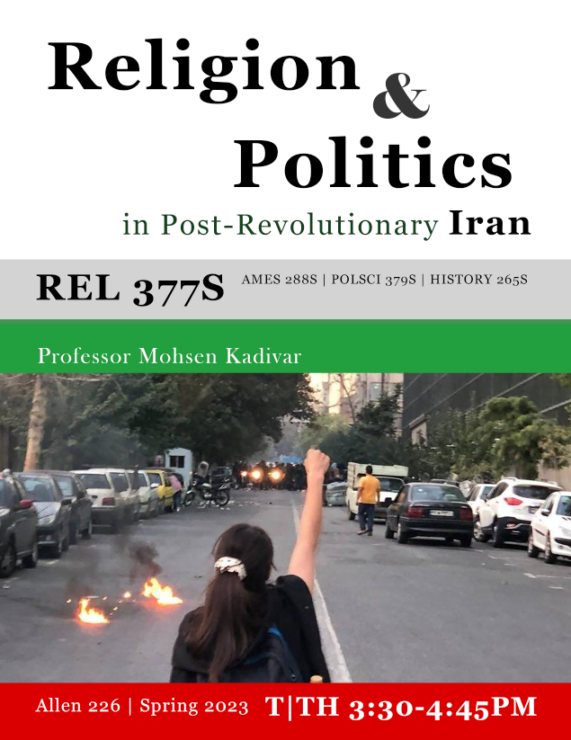
RELIGION 377S / AMES 288S / POLSCI 379S / HISTORY 265S
Religion and Politics in Post-Revolutionary Iran
Seminar
Spring 2023
Tu/Th 3:30-4:45 PM
Venue: Allen 226
Instructor: Professor Mohsen Kadivar
Debates on religion and politics in post-revolutionary Iran – whether in Iranian, Middle Eastern, or Western settings – are among the most pressing global issues in recent decades. The Islamic Republic of Iran has been one of the most controversial regimes since its inception. This course will narrate a fair and balanced story of more than four decades of religion and politics in Iran. It will explore a select sample of questions from political, sociological, and historical perspectives. Some key themes that will be analyzed in this course are answers to these questions:
What is the relationship between religion and politics in general and Islam and politics in particular? What are the major characteristics of Islamic political theology and ethics? What are the major stages of Shi’ite Islam and politics? What did happen in Iran between the two revolutions (1905 and 1979)? What does ‘political Islam’ or ‘Islamism mean’? What was Khomeini’s political thought? What are the major characteristics of the Iranian Constitution (1979 with the amendment of 1989)? What does theocracy do with secularism and democracy? What is the role of election in a quasi-democratic regime? How did regime expediency secularize the administration? What is the relationship between civil law and Islamic law (sharia)?
What is the role of religion (Shi’ite Islam) in Iranian politics, and economics? What are the major differences between Iranian Muslim fundamentalists, traditionalists, and reformists? Why did the Islamic Republic of Iran transform from a competitive electoral to a non-competitive electoral authoritarian regime? What is the situation of human rights, freedom, and justice in Iran? What are the major gender discriminations and women’s demands? What are the major religious and ethnic discriminations, and what are these minorities’ demands?
What are the major dimensions of Iranian foreign policy especially in relation with the US and Europe, Russia and China, the nuclear deal, and the Middle East crisis especially the Israel-Palestine conflict? What is the role of the Revolutionary Guards in Iranian politics, economics, and socio-cultural affairs? What are the major aspects of Khomeini’s and Khamenei’s administrations? What will be the future of the Islamic Republic of Iran?
The course includes six thematic sections. The first section will be the discussions on religion, politics, secularization, the state, and fundamentalism in general. The second section will explore discussions on Islam and politics, political Islam, and Islamic theocracy. The third section focuses on religion and politics in post-revolutionary Iran. This is the longest section. The case study of women’s matters in Iran will be the subject of section four. We will explore the Revolutionary Guards of the Islamic Republic as the most powerful authority in Iran and in the region briefly in the fifth section. The last section will be an overview of Shi’ite political thought, Islam, and the state from a Shi’ite perspective, and finally the transformation of the ‘Islamic Republic’ to the ‘Islamic State’ of Iran. There are separate books and articles for each section.
Iran is a multicultural society with linguistic, ethnic, sub-national, and religious diversity. Women’s movements as well as the social mobility of the middle class in contemporary Iran have been very dynamic. This course will focus on all these cultural diversities, their relationship to each other, and the effect of these diversities on the contemporary politics of Iran and Iranian identity. The course will also critically examine the concepts of identity, diversity, and power in the discourse of the Islamic Republic.

